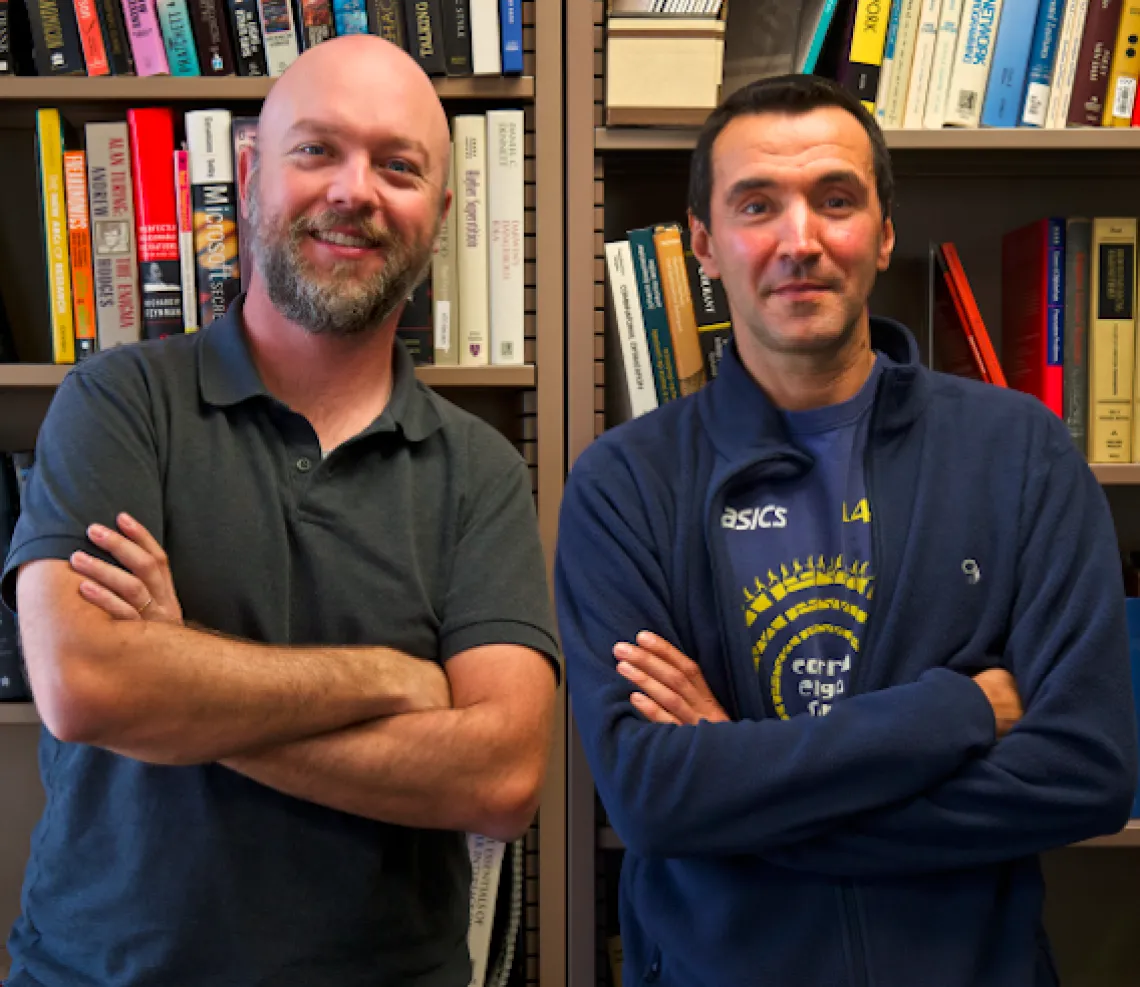Faculty Spotlight: Carlos Scheidegger

(Dr. Carlos Scheidegger pictured on the left, photo credit to Carl Philabaum)
Carlos is an associate professor in the Department of Computer Science at the University of Arizona. He works in large-scale data visualization and data analysis. Before coming to sunny, beautiful Tucson, he worked at AT&T Research in New York.
Where are you originally from?
I was born and raised in Porto Alegre in southern Brazil, and have lived in the US for just over 15 years now.
Growing up, what did you want to be?
I knew since I was maybe 6 or 7 that it would be something to do with computers. I had no idea I was going to enjoy doing research until I was almost done with my undergraduate degree. Even as I finished graduate school, I wasn't really sure where I was headed. Sometimes I like to think I'm not totally set yet, even though my entire professional life has been about CS research in some way or another.
What attracted you to academia?
There are few places that let you define your own goals and the terms of your success, while also giving you the means with which to achieve those goals. Like every other job, academia comes with its own set of nonsense, but I think it remains overwhelmingly a net positive for the world. I feel very lucky to be here today.
Can you tell me a little about your research and what led you to your field?
I started my research career in data visualization: using what we know about how vision works to create rich and beautiful pictures. I also work on data analysis: using math and computer science to enable people to understand the world better through data. More recently, I have worked on human-centered issues in machine learning, and especially in fairness. We study how machine learning can produce bad societal outcomes if we are not exceedingly careful with how to do it. I wish I could tell you I planned each of these moves carefully, but the truth is that I stumbled into each of the three areas! As an undergraduate student, I wanted to do research in programming languages, but the research assistantship I landed was in computer graphics. In graduate school, I started learning about data visualization---which I love to this day---but my first full-time job after I finished my PhD was in a lab that worked on a mix of data visualization, algorithms, data analysis, and statistics. Most recently, I started the work on fairness by literally asking a former professor if I could join them for lunch at a conference, where we happened to meet entirely by accident. We had a good conversation about the topic and ended up writing one of the early papers in the field. Six years and many papers later, this is still
What projects are you working on right now?
My colleagues Sorelle Friedler, Suresh Venkat, and I were just awarded a new grant for the NSF to do research on how one's position in a social network like LinkedIn and Twitter can play the same kind of role as socio-economic status in terms of privilege. We are designing new algorithms to figure out how this access to information shapes the experience of the participants in the network, and how to develop mechanisms to intervene in the network without exacerbating these issues. To give a concrete example, typical recommendation algorithms on network suffer from a "rich get richer effect": they recommend recruiters to connect with people who are already in a privileged position in the network, and creating this connection only makes the position more privileged. Are there better algorithms? Can we make them practical? That's what we're studying.
What do you enjoy most about your work?
I love that after doing research for about two decades, I can still get blown away by a new result. I remember learning about some result and going "no way, this is impossibly cool", and having to stop everything else to learn how this new thing works. When our research group comes up with something particularly nice, that joy is still 100% there. I love being able to do this for a living, and getting to share it with colleagues, mentors, mentees and collaborators.
What advice would you give to an aspiring educator/researcher?
Many of us don't remember what it felt like to be students. I'm at my best teaching and mentoring when I can remember what it felt like to be the student in that situation.
How do you like to spend your free time?
I'm working on playing fewer videogames (Spelunky 2 and Hades are the last two games I bought), cycling more (my original plan was to hit 5400 miles this year, but a clumsy crash and a pandemic later, I'll be happy to hit 3500), and getting better at the piano (where I define being good at the piano by "will our dog Daisy not get annoyed at my playing?").
What would people be surprised to learn about you?
As an undergraduate student, I didn't really like calculus, and I almost failed linear algebra and differential equations. My undergraduate math professors probably think I had no business being anywhere near math. Programming comes naturally to me, but math really does not; I grew to love math by finding connections. I remember trying to read everything I could that combined computer science and some other topic. I eventually came across Sussman and Wisdom's Structure and Interpretation of Classical Mechanics, which led me to Spivak's Calculus on Manifolds, and I realized that I was going to love math from then on.
What are your plans for sabbatical?
I'm spending a year at the NOIRLab (https://noirlab.edu/public/) working with some great astronomers on the ANTARES project, a system they have been developing to help astronomers and data scientists detect rare events in the sky.

